The Foam Glass Market is estimated to be valued at USD 2.5 billion in 2025 and is projected to reach USD 4.1 billion by 2035, registering a compound annual growth rate (CAGR) of 5.3% over the forecast period. Year-on-year (YoY) analysis highlights a steady growth trajectory driven by the material’s increasing application in insulation, construction, and industrial processes. From USD 1.9 billion in 2020, the market rose incrementally, touching USD 2.3 billion in 2024, before achieving USD 2.5 billion in 2025, reflecting an annual gain of around 7–9% in the short term.
Between 2025 and 2030, growth accelerates moderately as demand rises from green building initiatives, energy efficiency regulations, and growing use in cryogenic insulation for LNG and industrial storage. The market is expected to increase from USD 2.5 billion in 2025 to nearly USD 3.0 billion by 2030, driven by the adoption of sustainable construction materials as replacements for conventional insulation solutions. The period from 2030 to 2035 represents consolidation with wider global adoption. YoY growth remains stable, with market revenues expanding from USD 3.2 billion in 2031 to USD 4.1 billion in 2035. This reflects steady acceptance of foam glass as a durable, eco-friendly insulation material, ensuring consistent annual growth while reinforcing its role in both residential and industrial applications.
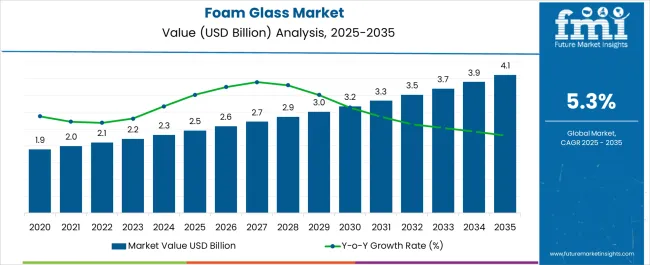
| Metric | Value |
|---|---|
| Foam Glass Market Estimated Value in (2025 E) | USD 2.5 billion |
| Foam Glass Market Forecast Value in (2035 F) | USD 4.1 billion |
| Forecast CAGR (2025 to 2035) | 5.3% |
The foam glass market is experiencing notable growth due to increasing emphasis on sustainable insulation materials and energy efficiency in modern construction practices. Foam glass offers high compressive strength, moisture resistance, and non combustibility, making it a favorable alternative to traditional insulation products.
The growing adoption of green building certifications and environmental regulations promoting eco friendly materials have further driven demand. Additionally, its inert and non toxic properties are appealing for use in chemical and industrial applications where thermal insulation and fire resistance are critical.
The market outlook remains strong as industries prioritize long term durability, minimal maintenance, and recyclability, positioning foam glass as a viable solution for infrastructure, industrial, and architectural applications.
The foam glass market is segmented by type, production process, application, and geographic regions. By type, the foam glass market is divided into open-cell foam glass, closed-cell foam glass, and mixed-cell foam glass. In terms of the production process, the foam glass market is classified into the crushed glass process, Glass powder process, Direct foaming process, and Slurry methods.
Based on application, the foam glass market is segmented into Building and Construction, Industrial, Chemical, Marine, and Others. Regionally, the foam glass industry is classified into North America, Latin America, Western Europe, Eastern Europe, Balkan & Baltic Countries, Russia & Belarus, Central Asia, East Asia, South Asia & Pacific, and the Middle East & Africa.
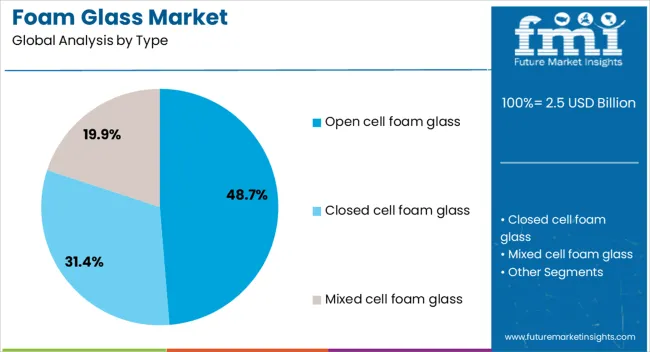
The open cell foam glass segment is expected to contribute 48.70% of the total market revenue by 2025, making it the leading type. This dominance is supported by its lightweight structure, superior acoustic insulation, and compatibility with a wide range of construction designs.
Its porous structure allows for effective sound absorption and thermal insulation in both wall systems and roofing assemblies. Furthermore, open-cell variants provide better flexibility for customized cutting and shaping during installation.
These advantages have increased its uptake across architectural applications focused on energy conservation and indoor comfort. The combination of technical versatility and environmental performance has reinforced the segment's leadership in the type category.
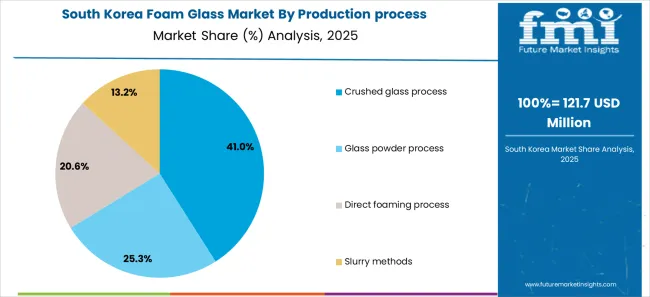
The crushed glass process segment is projected to hold 41.20% of the total market share by 2025 under the production process category. This process has gained preference due to its cost efficiency, material availability, and ability to recycle post-consumer glass waste.
The method enables controlled pore structure formation and offers consistency in insulation properties. Manufacturers have adopted this process to meet growing demand for sustainable and scalable production techniques while reducing energy consumption and carbon emissions.
The alignment with circular economy principles and ease of raw material sourcing have further supported its leading position within the production process segment.
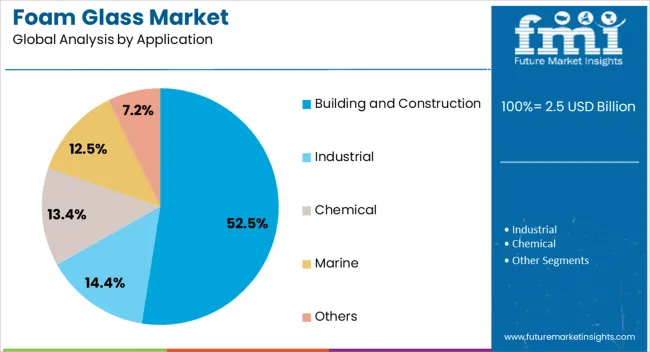
The building and construction segment is anticipated to account for 52.50% of the total foam glass market revenue by 2025, making it the dominant application. This segment’s growth is being propelled by the increasing need for fire-safe, moisture-resistant, and thermally stable materials in both residential and commercial infrastructure.
Foam glass is widely adopted in foundation insulation, green roofs, wall assemblies, and cold storage construction. Its long service life and resistance to biological degradation make it especially suited for harsh environments and high-performance building envelopes.
As regulatory frameworks advance toward net-zero energy buildings and sustainable urban development, foam glass continues to gain traction as a critical component in modern construction practices.
The foam glass market is growing steadily, driven by increasing demand for sustainable, durable, and high-performance insulation materials. Foam glass, known for its lightweight structure, fire resistance, moisture resistance, and thermal insulation properties, finds applications in construction, industrial insulation, and cryogenic storage. Rising emphasis on green building materials and energy-efficient infrastructure is fueling adoption. Europe leads the market with strong environmental policies, while North America and Asia-Pacific are expanding with infrastructure and industrial growth. Market differentiation focuses on eco-friendly production methods, recycling of glass waste, and application-specific product development.
Foam glass production heavily relies on recycled glass, additives, and energy-intensive processes. Variability in raw glass quality and impurities can affect material performance, density, and durability. High energy consumption during manufacturing contributes to cost pressures, making foam glass less competitive compared to traditional insulation materials. Limited suppliers and lack of standardized production methods add complexity for consistent quality assurance. Until broader recycling infrastructure and cost-efficient production technologies are established, manufacturers may face challenges in scaling production and maintaining cost competitiveness.
Ongoing technological advances are transforming the electric boiler market. Improved heating elements, precision temperature controls, and efficient heat exchange systems extend performance and durability. Integration with smart home and industrial automation systems allows real-time monitoring, remote control, and optimized energy consumption. Modular and compact designs enable flexible installation, while hybrid systems combining renewables and electric boilers ensure reliable performance. Manufacturers investing in R&D for high-efficiency, low-maintenance models appeal to both eco-conscious consumers and industrial operators. As efficiency, digital connectivity, and flexibility become critical differentiators, innovative electric boiler technologies are driving stronger adoption across diverse end-user segments.
Regional regulations strongly influence electric boiler adoption. Europe drives market leadership through strict decarbonization targets, carbon pricing policies, and bans on fossil-fuel-based heating in new buildings. North America emphasizes energy efficiency standards, while Asia-Pacific markets are gradually adopting supportive frameworks. However, inconsistent policies and regulatory fragmentation across regions create uncertainty for manufacturers and end users. Electricity generation sources also affect adoption: in coal-reliant grids, environmental benefits diminish, reducing policy support. Clear labeling, safety certifications, and compliance with energy performance rules are essential for broader adoption. Until global policy alignment emerges, regional regulations and power mix differences will continue shaping adoption rates.
The market is moderately consolidated, with a few established players dominating global production. Competition is based on product performance, sustainability claims, and cost efficiency. Supply chain challenges include dependency on recycled glass collection, energy costs, and logistics for heavy insulation materials. Manufacturers investing in local recycling networks, energy-efficient production, and regional facilities gain a competitive edge. Differentiation through certified eco-friendly materials, customized solutions, and strong distribution partnerships will remain key in overcoming supply challenges and competing effectively in the construction and industrial insulation sectors.
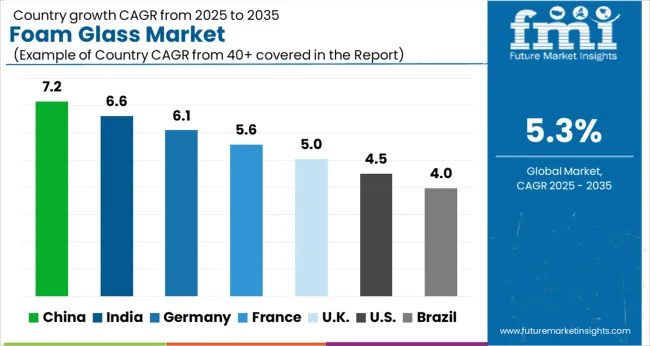
| Countries | CAGR |
|---|---|
| China | 7.2% |
| India | 6.6% |
| Germany | 6.1% |
| France | 5.6% |
| UK | 5.0% |
| USA | 4.5% |
| Brazil | 4.0% |
The global Foam Glass Market is projected to grow at a CAGR of 5.3% through 2035, supported by increasing demand across insulation, construction, and industrial applications. Among BRICS nations, China has been recorded with 7.2% growth, driven by large-scale production and deployment in construction and energy projects, while India has been observed at 6.6%, supported by rising utilization in building materials and industrial applications. In the OECD region, Germany has been measured at 6.1%, where production and adoption for insulation and construction purposes have been steadily maintained. The United Kingdom has been noted at 5.0%, reflecting consistent use in industrial and building projects, while the USA has been recorded at 4.5%, with production and utilization steadily increasing across the construction, insulation, and energy sectors. This report provides insights into 40+ countries; the top markets are highlighted here for reference.
The foam glass market in China is growing at a CAGR of 7.2%, supported by rapid urbanization, large-scale infrastructure projects, and the country’s focus on sustainable building materials. Foam glass, known for its lightweight, fire-resistant, and insulating properties, is increasingly used in construction, industrial insulation, and energy-efficient projects. The push for green buildings and government initiatives promoting energy conservation and fuel adoption. Additionally, foam glass is gaining traction in oil & gas, chemical industries, and cold storage facilities due to its resistance to moisture, corrosion, and extreme temperatures. China’s expanding manufacturing base and rising investments in industrial facilities further strengthen market growth. Increasing demand for environmentally friendly materials that reduce carbon emissions also supports long-term adoption. With growing awareness of sustainable construction practices and technological advancements in foam glass production, China remains a leading market for this material.
The foam glass market in India is expanding at a CAGR of 6.6%, driven by rising demand for energy-efficient and sustainable construction materials. With urbanization and infrastructure development accelerating, foam glass is being increasingly used in green buildings, industrial insulation, and transport infrastructure. Its properties—lightweight structure, moisture resistance, and fireproofing- make it a preferred choice for construction companies aiming to meet modern safety and sustainability standards. Adoption is also strong in oil & gas, cold storage, and chemical industries, where insulation and durability are critical. Government initiatives supporting sustainable development, along with incentives for green infrastructure, provide further market momentum. Additionally, India’s growing industrial sector and focus on reducing carbon footprints are fueling demand for environmentally friendly materials like foam glass. As awareness of energy conservation grows, foam glass is set to play a larger role in India’s construction and industrial applications.
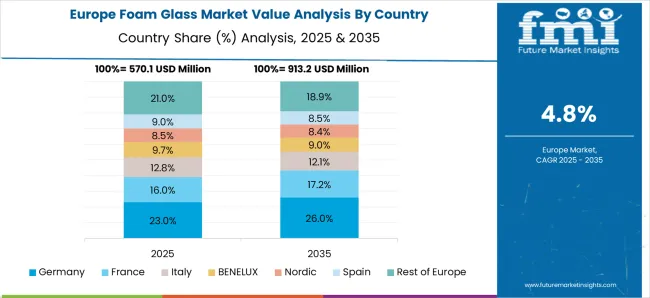
The foam glass market in Germany is growing at a CAGR of 6.1%, supported by stringent energy efficiency regulations, sustainable construction practices, and advanced industrial applications. Foam glass is widely used for building insulation, industrial facilities, and transport infrastructure due to its fire-resistant and thermal insulation properties. Germany’s focus on eco-friendly construction materials is creating steady demand, particularly in green building projects. Adoption is also growing in the chemical and oil & gas industries, where foam glass provides effective insulation and resistance to extreme conditions. With strong environmental policies and the EU’s push for reducing carbon emissions, foam glass is gaining traction as a sustainable alternative to traditional insulation materials. Furthermore, German manufacturers are investing in innovation to enhance the durability, strength, and cost-effectiveness of foam glass products. This ensures the material’s growing presence in both residential and industrial sectors.
The foam glass market in the United Kingdom is expanding at a CAGR of 5.0%, driven by sustainable construction initiatives, safety regulations, and infrastructure development. Foam glass is valued for its thermal insulation, fire resistance, and durability, making it suitable for residential, commercial, and industrial projects. Adoption is particularly strong in green building projects, where eco-friendly materials are prioritized to meet energy efficiency goals. Additionally, industries such as oil & gas, chemicals, and cold storage are incorporating foam glass for insulation and protection. Government policies promoting low-carbon construction and investments in sustainable infrastructure further support market growth. Technological advancements in foam glass production, including higher durability and improved insulation efficiency, are boosting adoption. As the UK accelerates its efforts toward achieving carbon-neutral goals, the demand for foam glass in construction and industrial applications is set to increase steadily.
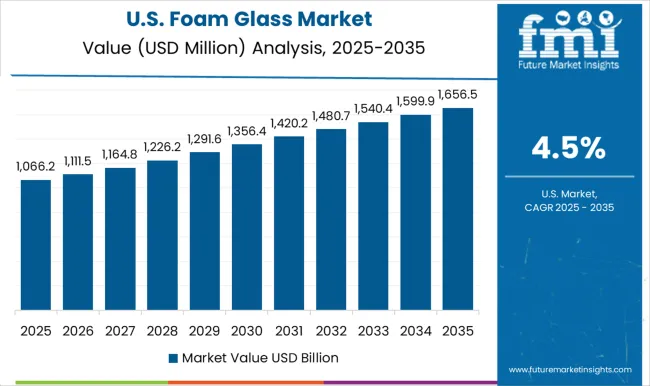
The foam glass market in the United States is growing at a CAGR of 4.5%, supported by rising demand for energy-efficient building materials and industrial insulation solutions. Foam glass is increasingly adopted in construction projects for its fire resistance, lightweight structure, and insulating properties. The USA government’s emphasis on green building codes and energy conservation enhances market prospects. Industrial sectors such as oil & gas, chemicals, and refrigeration also drive demand, as foam glass offers superior durability and moisture resistance. The market is further fueled by technological improvements in foam glass manufacturing, making it more cost-effective and performance-driven. Adoption is increasing in both residential and commercial construction as awareness of sustainable building practices grows. With ongoing investments in energy-efficient infrastructure and sustainable development initiatives, the foam glass market in the United States is expected to experience steady long-term growth.
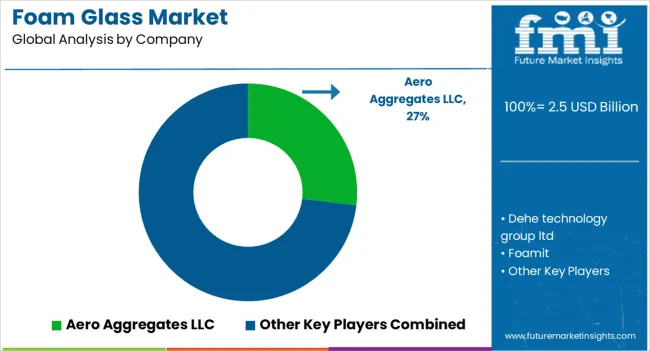
The foam glass market is gaining significant traction as industries prioritize sustainable and energy-efficient insulation materials. Foam glass, made from recycled glass, is widely valued for its lightweight structure, fire resistance, chemical durability, and excellent thermal and acoustic insulation properties. It is extensively used in construction, industrial insulation, oil & gas, and cryogenic applications. The market is being driven by increasing demand for green building solutions and circular economy practices. Aero Aggregates LLC is a prominent supplier specializing in ultra-lightweight foam glass aggregates manufactured from 100% recycled glass, serving the infrastructure and construction industries. Dehe Technology Group Ltd offers advanced foam glass products focused on high-performance insulation applications.
Foamit is known for producing sustainable foam glass granules used in building and landscaping. Kanthal, a subsidiary of Sandvik, contributes with its technological expertise in materials and thermal processing, including foam glass solutions. Langfang Chaochen Thermal Insulation Materials Co., Ltd and Mikewye Ltd supply durable and cost-efficient foam glass products tailored for industrial and construction needs. Owens Corning, a global leader in insulation materials, has expanded its portfolio to include foam glass, strengthening its commitment to sustainable solutions. Pinosklo and Polydros manufacture foam glass blocks and granules, supporting applications in both energy-efficient construction and industrial sectors. Refaglass is another key producer utilizing recycled glass to create eco-friendly foam glass insulation materials. TECHNOpor focuses on lightweight, load-bearing foam glass aggregates that promote sustainability in modern construction.
| Item | Value |
|---|---|
| Quantitative Units | USD 2.5 Billion |
| Type | Open cell foam glass, Closed cell foam glass, and Mixed cell foam glass |
| Production process | Crushed glass process, Glass powder process, Direct foaming process, and Slurry methods |
| Application | Building and Construction, Industrial, Chemical, Marine, and Others |
| Regions Covered | North America, Europe, Asia-Pacific, Latin America, Middle East & Africa |
| Country Covered | United States, Canada, Germany, France, United Kingdom, China, Japan, India, Brazil, South Africa |
| Key Companies Profiled | Aero Aggregates LLC, Dehe technology group ltd, Foamit, Kanthal, Langfang Chaochen Thermal Insulation Materials Co., Ltd, Mikewye Ltd, Owens corning, Pinosklo, Polydros, Refaglass, and TECHNOpor |
| Additional Attributes | Dollar sales vary by product type, including closed-cell, open-cell, and hybrid foam glass; by application, such as building & construction, industrial insulation, cryogenic systems, and soundproofing; by region, led by North America, Europe, and fast-growing Asia-Pacific. Growth is driven by sustainability, thermal performance, recycled content, and green building codes. |
The global foam glass market is estimated to be valued at USD 2.5 billion in 2025.
The market size for the foam glass market is projected to reach USD 4.1 billion by 2035.
The foam glass market is expected to grow at a 5.3% CAGR between 2025 and 2035.
The key product types in foam glass market are open cell foam glass, closed cell foam glass and mixed cell foam glass.
In terms of production process, crushed glass process segment to command 41.2% share in the foam glass market in 2025.






Our Research Products

The "Full Research Suite" delivers actionable market intel, deep dives on markets or technologies, so clients act faster, cut risk, and unlock growth.

The Leaderboard benchmarks and ranks top vendors, classifying them as Established Leaders, Leading Challengers, or Disruptors & Challengers.

Locates where complements amplify value and substitutes erode it, forecasting net impact by horizon

We deliver granular, decision-grade intel: market sizing, 5-year forecasts, pricing, adoption, usage, revenue, and operational KPIs—plus competitor tracking, regulation, and value chains—across 60 countries broadly.

Spot the shifts before they hit your P&L. We track inflection points, adoption curves, pricing moves, and ecosystem plays to show where demand is heading, why it is changing, and what to do next across high-growth markets and disruptive tech

Real-time reads of user behavior. We track shifting priorities, perceptions of today’s and next-gen services, and provider experience, then pace how fast tech moves from trial to adoption, blending buyer, consumer, and channel inputs with social signals (#WhySwitch, #UX).

Partner with our analyst team to build a custom report designed around your business priorities. From analysing market trends to assessing competitors or crafting bespoke datasets, we tailor insights to your needs.
Supplier Intelligence
Discovery & Profiling
Capacity & Footprint
Performance & Risk
Compliance & Governance
Commercial Readiness
Who Supplies Whom
Scorecards & Shortlists
Playbooks & Docs
Category Intelligence
Definition & Scope
Demand & Use Cases
Cost Drivers
Market Structure
Supply Chain Map
Trade & Policy
Operating Norms
Deliverables
Buyer Intelligence
Account Basics
Spend & Scope
Procurement Model
Vendor Requirements
Terms & Policies
Entry Strategy
Pain Points & Triggers
Outputs
Pricing Analysis
Benchmarks
Trends
Should-Cost
Indexation
Landed Cost
Commercial Terms
Deliverables
Brand Analysis
Positioning & Value Prop
Share & Presence
Customer Evidence
Go-to-Market
Digital & Reputation
Compliance & Trust
KPIs & Gaps
Outputs
Full Research Suite comprises of:
Market outlook & trends analysis
Interviews & case studies
Strategic recommendations
Vendor profiles & capabilities analysis
5-year forecasts
8 regions and 60+ country-level data splits
Market segment data splits
12 months of continuous data updates
DELIVERED AS:
PDF EXCEL ONLINE
Foam Glass Granulate Market Size and Share Forecast Outlook 2025 to 2035
Glass Rolling Forming Machine Market Size and Share Forecast Outlook 2025 to 2035
Foam Type Vacuum Gripping System Market Size and Share Forecast Outlook 2025 to 2035
Glass Liquor Bottle Market Size and Share Forecast Outlook 2025 to 2035
Glass Bottles Market Forecast and Outlook 2025 to 2035
Glass Laser Engraving Machine Market Size and Share Forecast Outlook 2025 to 2035
Glass Restoration Kit Market Size and Share Forecast Outlook 2025 to 2035
Foam Mixing Machine Market Size and Share Forecast Outlook 2025 to 2035
Glass Bottle and Container Market Forecast and Outlook 2025 to 2035
Glass Additive Market Forecast and Outlook 2025 to 2035
Foam Market Size and Share Forecast Outlook 2025 to 2035
Foam-Free Pad Formers Market Size and Share Forecast Outlook 2025 to 2035
Glass Reactor Market Size and Share Forecast Outlook 2025 to 2035
Glass Cosmetic Bottle Market Size and Share Forecast Outlook 2025 to 2035
Foam Cups Market Size and Share Forecast Outlook 2025 to 2035
Glass & Metal Cleaner Market Size and Share Forecast Outlook 2025 to 2035
Glass Product Market Size and Share Forecast Outlook 2025 to 2035
Foam Bottle Technology Market Size and Share Forecast Outlook 2025 to 2035
Glassine Paper Market Size and Share Forecast Outlook 2025 to 2035
Glass Container Market Size and Share Forecast Outlook 2025 to 2035

Thank you!
You will receive an email from our Business Development Manager. Please be sure to check your SPAM/JUNK folder too.
Chat With
MaRIA